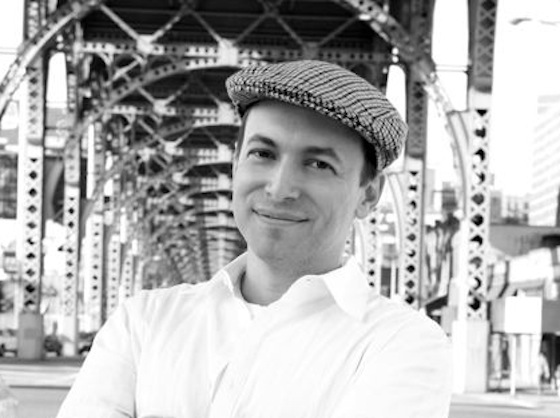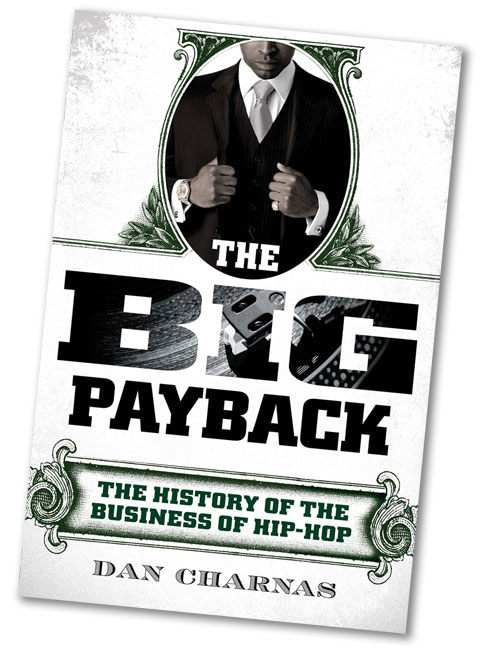Interview by Tony Samuel
The Big Payback –The History Of The Business Of Hip Hop shows the origin of the business of Hip Hop. It vividly details the untold history of the movers and shakers in Hip Hop. In part two of this Insomniac Magazine Hip Hop music industry exclusive, author Dan Charnas takes us down a narrow road with a litany of characters that were responsible for elevating the business of Hip Hop.
From Jay Z, Master P, Cash Money Millionaires, Russell Simmons and Wendy Day, we get an inside view of the power brokers and moguls in Hip Hop. As a historical note, Insomniac’s own Israel Vasquetelle was one of the first Hip Hop journalists to chronicle the momentous $33 million deal Cash Money negotiated with Universal Records by traveling to New Orleans to meet and interview Cash Money’s founders and their artists, including Lil Wayne. Hip Hop’s own power broker extraordinaire Wendy Day helped to facilitate that deal.
The Big Payback is a tale of hustle, passion, entrepreneurship, vision, greed and much more. Dan Charnas paints a picture only an insider could deliver. Let’s continue with part two:
What is your view of Russell Simmons and his influence over the business of Hip Hop?
Russell Simmons is such a big topic that I have a number of views about Russell Simmons. He represented a young Black man who understood this culture, who fought for it tirelessly…Russell had many flaws…he was not the most organized dude…he wasn’t the most responsible dude…in the beginning he was a substance abuser…he wasn’t the best A&R man…those flaws are just minor when compared to the doggedness of his hustle, his promotional sensibilities…his marketing…his vision…Russell is a father to us all! Russell allowed us all to eat.
Now, the whole Jay Z and Damon Dash breakup, what is your view of that? In your research, did you find any evidence to show that Jay Z orchestrated the sale of Rocafella and the eventual ownership of Rocafella reverting back to him?
I did not interview Jay Z, but I did some pretty vigorous reporting around Jay Z. If you ask me what I think happen, I don’t think he went into the game wanting to build a company with partners and then ejecting his partners. I don’t even think he had a mind to be a mogul. Jay Z is a lone wolf…that is who he was from the start…he was a lone wolf who had fans…who had partners. In the end, if pressed against the wall, what is a wolf going to do…He has no problem biting off whatever hand that is trying to hold him back. Jay Z just found new partners because he felt, rightly, that he could go off on his own and do what he needed to do. In the end he was very shrewd…Dame has nobody to blame for the fact he is no longer a partner with Jay. Dame became a liability. I don’t fault Jay for turning on Dame, but it was very hurtful for Dame…but that is just business.
Just by me being in the scene, it seemed like he was trying to be as big as the artist. If you are going to handle the business…handle the business…
Listen, he is just obnoxious and ultimately not the smartest businessman he could be…He was just too extravagant to be a businessman. His eyes were way bigger than his stomach…he drove the car faster and faster and faster…he just couldn’t control it…and Jay Z basically got control of the car and pushed Dame out before he killed everybody. Dame had a chance to show he could do it again…like Jay said, ‘People say they make Hov, then make another Hov’… He hasn’t…It’s not that he can’t…it’s just that Dame is too attached to the past and to being right…to spiritually move on. I believe if Dame wanted to do build something again he could…if he jettison some of his baggage.
Who would you say are some of the top strategic thinkers right now in Hip Hop and why?
That is a really good question. I am going to answer that by saying strategic thinking is not quite as prevalent in Hip Hop as it once was because there is less need for it in some way…people are more comfortable…when you are outside looking in…when you are outside the castle looking in and your trying to get in…you are going to be very strategic. Once you are inside the castle, there is little need for that… I think Jay is very much a great strategic thinker. I think Diddy, although he may not be the greatest thinker, I think he is a tireless promoter…his willingness to go back to square one every time…hit the streets…I don’t know if Lyor (Cohen) is a strategic thinker, I think he is a shrewd businessman, but I don’t know if he is a visionary. I think Russell thinks deeply about what’s next…again he is not always right, but he does think about it…I don’t know if folks like Drake and Lil Wayne or Kanye really think strategically in a business sense, because they are more artists at heart. I think folks like 50 Cent and Eminem…and I have to mention Chris Lighty…he is a great strategic thinker.
Some would argue that hustlers and drug dealers almost destroyed the Hip Hop business?
I don’t know about that. What I tried to show in the book is that Hip Hop was born out of an environment that had been completely de-industrialized…the economy of places like Harlem had been absolutely decimated…the middle class had left and industry had left…there was nothing left but the hustle…Hip Hop created a real culture of ownership and sovereignty. It made sense that some of the thought leaders would come from the drug gang to something that was more legitimate…some people started in the rap game and went to the drug game to keep their record company alive…some people came from the drug game to the rap game because they found out it was better to have two enterprises instead of one…some people wanted to leave drugs entirely…Two things come to mind…one is artistic and the other is about behavior…the whole keep it real movement…Schooly D was definitely doing that before anybody else…but his presence was balanced out…for every Schooly D there was a Kwame and a Biz (Markie)…in the keep it real era in the 90’s there was no room for anything…everybody was talking about keeping it real, but the funny thing about it…a lot of it wasn’t real…that was the crazy sh*t. Especially when it got in to the hands of Puffy, I think that was Puffy’s greatest crime…he took the street stuff and made it really stylized and Biggie is sort of the result of that. Biggie, as a lyricist is pure as the driven snow, but Biggie as a marketing concept…together with Tupac…they created a air of moral nihilism…(by saying) ‘I am ready to die…I am going to die…I am dead already…I am about to die’…guess what, your words have power…they died…they talked themselves into the grave…I am serious about this…the rise of somebody like Suge Knight, there has always been gangsters in music like Gene Griffin in the R&B days and Joe Robinson who threw his weight around a little bit…Suge Knight again, is just another in a long succession of bullies…I think that type of behavior have no place in anything…bullies will flourish for a time and scare everyone but sooner or later they will burn their own house down. That’s what Suge Knight did.

Karma is something else.
Yep, yep. It doesn’t have to be something as complex as karma. It really is action and reaction in this life.
They brought a lot of negativity to the game.
That is why Suge is not around today. That’s why Dana and Lawrence Goodman are not around today. That is why Gene Griffin is not around today…that is why Rosemond (Jimmy) is not bigger than he is. People want to make some money, stay away from the bullsh*t…make some music…hang around with the pretty girls…
During your extensive research, what would you say are the three things that surprised you the most?
That’s a good question. Some of them I can’t say because I was asked to not reveal them.
Not to cut you off, but that was my next question…are there any secrets you did not print?
I try to honor my agreements with people. Even with the stuff people ask me not to reveal…it was always an ask…they wanted me to know…it was the stuff people would tell me after the book was already out…speaking of Suge, I just spoke to somebody who I mentioned briefly in the book…who worked with Suge…Suge had to answer to somebody too…that person bullied Suge in his heyday. Most of the surprises were when I would speak to people like Ann Carli…no one knows how much she did for Will Smith, how much she did for KRS One and Boogie Down Productions, R Kelley, Aaliyah, A Tribe Called Quest…basically in starting all these careers she helped found what we now know as artist development in Hip Hop…she was responsible for the Stop The Violence Movement…this Japanese Italian woman from upstate New York… That is incredible to me! Fab Five Freddy…Did anybody know his grandfather worked for Marcus Garvey and his father was in the Audubon Ballroom when Malcolm X was assassinated? Fab Five Freddy was intimately involved with Time Warner and helped smooth over the rough edges between Ice T and Time Warner during the cop killer controversy. Fab Five Freddy made a lot of important connections for people. Wendy Day…she was instrumental in creating fortunes for people. Master P – Wendy Day, Cash Money – Wendy day, Eminem – Wendy Day…you feel me!
Absolutely, I know about Wendy Day. I remember Wendy Day when she used to come up to WNWK on the Kevin Keith & The Dirty Dozen Show. She was always good people. She made a lot of power moves. It was crazy when I read in your book that the Cash Money cats didn’t want to pay her.
Yep, yep.
A lot of these artists complain about being robbed, but when they become the entrepreneurs and the record company owners, they continue with the same oppressive contracts. What’s your view on that?
Well, it’s human behavior. I’ve been in the industry long enough to know we are all participants in this drama. People who blame Hip Hop and don’t blame society and public policy are fooling themselves…People who think artist are pristine and pure…everybody in the record business is just sharks are fooling themselves…People who think that the commercialization of Hip Hop is the death of Hip Hop is fooling themselves… That’s part of the reason I wrote the book, to show that people did care in the industry…if people in the industry did not care and did not believe in Hip Hop, Hip Hop would not exist. Hip Hop could have ended up like Go Go…which basically defied all attempts to commercialize it…Then nobody would know about Afrika Bambaata…Kool Herc and Grand Master Flash…
What’s next for Dan Charnas?
What’s next for Dan Charnas is to give my wife and my son plenty of time. I co-wrote a book with Bill Adler…the first publicist for Def Jam and Rush. We wrote an oral history of Def Jam to commemorate its 25th anniversary. I have an essay called Last Night A DJ Saved My Business. It is coming out next month in a book called Hip Hop: A Cultural Odyssey…I am plotting my next takeover.
It was definitely nice talking to you. Thank you for the conversation. Your book really captivated me. I wish you the best in everything.
Thank you for the opportunity to talk about the book and thank you for reading it.
Read part one here.
-Tony Samuel



